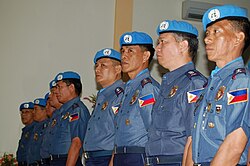| UN Security Council Resolution 1704 | ||
|---|---|---|
 UNMIT police | ||
| Date | 25 August 2006 | |
| Meeting no. | 5,516 | |
| Code | S/RES/1704 (Document) | |
| Subject | The situation in East Timor | |
Voting summary |
| |
| Result | Adopted | |
| Security Council composition | ||
Permanent members | ||
Non-permanent members | ||
| ||
United Nations Security Council Resolution 1704, adopted unanimously on August 25, 2006, after reaffirming previous resolutions on East Timor (Timor-Leste), particularly resolutions 1599 (2005), 1677 (2006), 1690 (2006) and 1703 (2006), the Council established the United Nations Integrated Mission in East Timor (UNMIT) for an initial period of six months. [1]
Contents
The passage of the resolution saw UNMIT replace the United Nations Office in East Timor (UNOTIL), the fifth mission in seven years. [2]